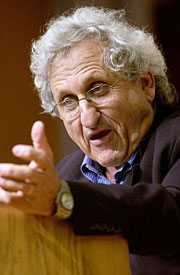BY JOHN SANFORD
Jewish identity is often defined by a lack of definition, according to Israeli novelist A. B. Yehoshua, who spoke Thursday in Kresge Auditorium.
"There is even something ridiculous about an ancient nation that is still, after some 3,300 years, hammering so intensely and so obsessively at the enigma of its identity," Yehoshua said. In a more than hour-long speech, he asserted that the notion of Jewish identity as mysterious and enigmatic provides fertile ground for anti-Semitism.
About 450 people came to listen to the lecture, "The Root of Anti-Semitism," whose content was as ambitious -- and provocative -- as the title suggests. Yehoshua admitted that his thesis was more an attempt than a "sound theory" and noted that professional historians probably would be averse to trying to identify a common root or "gene" for Jew-hatred through the ages. But he said he hoped to inspire historians to look more seriously at this possibility.
Given that Jews are scattered around the world and speak different languages, they rely on their imaginations to "connect" with one another and maintain a sense of national unity, he said.
"The non-Jew living in an everyday mutual relationship alongside the Jew can also connect his own imagination to the Jew's imagination," Yehoshua said. "He can connect with the mechanism of the Jew's unidentified elements and ... project his fantasies, fears and wishes on them, for better or, mainly, for worse."
Yehoshua spoke at a time of increasing concern about resurgent anti-Semitism. A wave of well-publicized anti-Jewish attacks has swept parts of Europe, especially France, in recent years. On March 31, the European Monitoring Centre on Racism and Xenophobia released a report that said attacks on Jews have risen in several European countries over the past two years. The report said, "The largest group of the perpetrators of anti-Semitic activities appears to be young, disaffected white Europeans. A further source of anti-Semitism in some countries was young Muslims of North African or Asian extraction."
In his speech, Yehoshua referred to statements by former Malaysian Prime Minister Mahathir Mohammed, who said in an October speech that "today the Jews rule the world by proxy," and prominent Greek composer Mikis Theodorakis, who in November called Jews "the root of all evil." But much of what Yehoshua said was counterintuitive, such as his assertion that anti-Semitism among Palestinians is less intense than in surrounding Arab countries.
"Why? Because we are real. [The Palestinians] hate us, but ... they see us in our real dimension," he said.
That argument, which Yehoshua made in response to a question from the audience, goes to the heart of his thesis: that anti-Semitism takes root when people substitute fearful fantasies for what they can't nail down about Jewish identity. For this reason, artists, with their often fervid and disturbing imaginations, sometimes show the severest expressions of anti-Semitism, he said. It is also for this reason, Yehoshua said, that Jews must clarify their identity and work to understand "the dangerous, pathological interaction that sometimes occurs between Jews and their surroundings."
Many Zionist and secular Jewish intellectuals of the early 20th century tried to thoroughly and objectively examine the motives of anti-Semites, Yehoshua said. But this trend all but ground to a halt as a result of the world wars, "lest any kind of objective understanding, even the most reserved, would confer indirect legitimacy on the worst crimes in all of history," he added.
He cautioned against describing Jewish identity through "romantic evasions" about "mystery and enigma," quoting Freud as saying Jews and Judaism are invested with "an irresistible attraction" and "emotions that have great power precisely because they could not be defined in words."
"If there is a clear lesson in the Holocaust, in my opinion, it is a lesson that obliges us to make every serious intellectual effort to understand -- but heaven forbid to not justify -- the rationales that bring people to commit such terrible crimes against the Jews," he said. "We must empower ourselves against possible future attacks. Part of this empowerment and preparation for the possibility of more destruction ... [is] not just a profound understanding of the evil and its roots, but a profound understanding of the roots of Jewish being and its interaction with the world around it."
In concluding his remarks, he explained that if he were addressing a roomful of anti-Semites, he would tell them: "It is not by chance that you are projecting so much about the Jews, because the Jews invite you by this imaginative identity to do this projection. But before you do this false projection, try to understand a little bit what is your problem."
English Professor John Felstiner, an editor of Jewish American Literature: A Norton Anthology, described the talk as a "strong and strongly written speech," but also admitted some reservations about it.
"Yehoshua's perception of Jews' unclear identity as a trigger of Jew-hatred does seem to saddle Jews with some sort of blame," he said in an e-mail. "Specifically, I felt his talk hovered over but never settled into a related conviction of his: namely, the possibility of normative Jewish life in the land of Israel and the futility of identifiably Jewish existence in the Diaspora, away from Israel. I wish he'd vented that (to me, not exactly tenable) thought as well."
Yehoshua's most recent novel is The Liberated Bride. He was born in Jerusalem in 1936. Today he lives in Haifa. His talk was made possible by the Jewish Community Endowment Fund Lecture, organized by the Taube Center for Jewish Studies.



